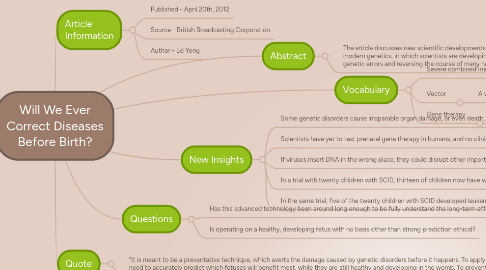Will We Ever Correct Diseases Before Birth?
by Breanne Iverson

1. Article Information
1.1. Published - April 20th, 2012
1.2. Source - British Broadcasting Corporation
1.3. Author - Ed Yong
2. Abstract
2.1. The article discusses new scientific developments in the realm of modern genetics, in which scientists are developing ways of editing genetic errors and reversing the course of many hard-to-treat diseases.
3. Vocabulary
3.1. Severe combined immunodeficiency (SCID)
3.1.1. An immune disorder that leaves people fatally vulnerable to disease.
3.2. Vector
3.2.1. A vehicle used to transfer genetic material to a target cell.
3.3. Gene therapy
3.3.1. The use of DNA as a pharmaceutical agent to treat disease.
4. New Insights
4.1. Some genetic disorders cause irreparable organ damage, or even death, very early; with some of the diseases, five years old is too late.
4.2. Scientists have yet to test prenatal gene therapy in humans, and no clinical trials are in the works
4.3. If viruses insert DNA in the wrong place, they could disrupt other important genes, and cause cancers or developmental problems
4.4. In a trial with twenty children with SCID, thirteen of children now have working immune systems
4.5. In the same trial, five of the twenty children with SCID developed leukemia as a result of their treatment
5. Questions
5.1. Has this advanced technology been around long enough to be fully understand the long-term effects on a person’s health?
5.2. Is operating on a healthy, developing fetus with no basis other than strong prediction ethical?
6. Quote
6.1. "It is meant to be a preventative technique, which averts the damage caused by genetic disorders before it happens. To apply such risky and contentious strategy, we need to accurately predict which fetuses will benefit most, while they are still healthy and developing in the womb. To prevent, we must first predict."


